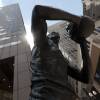Massachusetts is mourning the death of Boston Celtics legend Bill Russell, and reckoning with the racism that he faced as the franchise’s first Black icon and as a committed civil rights activist.
The basketball center powered the Celtics to 11 NBA championships between 1957 and 1969, winning five MVP awards in the process. His hiring as the Celtics’ head coach in 1966 made him the first Black person to lead any team in major North American sports. Russell was inducted into the Naismith Memorial Basketball Hall of Fame as both a player and a coach . He died Sunday at the age of 88.
At a statue of Russell located just outside Boston City Hall, fans have been leaving flowers and Celtics jerseys to honor the legend. Gregory Baker, a lifelong resident of Roxbury, came downtown to pay his respects Monday.

“He was the best player I ever saw, he was a winner,” Baker said. “People talk about Michael Jordan, Lebron and everything like that — but their stats, they don't have the winning percentage that he has.”
Baker and other fans also applauded Russell for being a formidable force with his off-court activism. As a staunch social justice advocate who marched with Martin Luther King Jr. and publicly backed Muhammed Ali’s refusal to be drafted into the Vietnam War, Russell faced criticism for his willingness to mix his play with his politics.
“We expect the athlete to be grateful for everything they get,” said sports journalist Howard Bryant, author of "The Heritage: Black Athletes, a Divided America, and the Politics of Patriotism," a book that in part profiled Russell and his activism. “'You’re just playing a kid’s game, you should be happy.' We’ve heard all those tropes and cliches before, but Bill Russell would not separate those two.”
In a 2001 interview with GBH’s Basic Black, Russell cast his civil rights stance as a matter of civic duty. “I was born with full citizenship. My citizenship has never been a gift of my friends and neighbors,” said Russell. “I’m a citizen and I demand everything that goes along with being a citizen.”
Russell’s advocacy and the color of his skin won him enemies, including in Massachusetts. His home in Reading was broken into and vandalized; the intruders scrawled racial slurs on the walls and defecated in the beds.
Though his ties with the Celtics remained warm after his retirement in 1969 — Russell once described it as a “love affair” — his relationship with Boston was complicated and, at times, frosty. At one point, he referred to the city as a “flea market of racism.” Still, Russell recognized that Boston’s problems with race were not unique.
“I think you would find the situation the same in every major city,” said Russell in the 2001 Basic Black interview.
Boston still has a reputation for racism, particularly among athletes, some of whom have been the target of racial slurs from the stands. In a recent interview, basketball star Lebron James called the city "racist as f***."
But some fans say Russell did help move the city forward. Rhonda Morris, a lifelong resident who also came to pay her respects at Russell's statue in downtown Boston, credited him with pushing many Bostonians to reflect on racism and recalibrate their behavior.
“Going to school in 10th grade to Hyde Park High, our buses got stoned because they didn’t want African Americans in the community,” said Morris. “Today you can go to Hyde Park and there’s no issues. I would thank him for everything he’s done.”
Peter Roby, former athletic director at Northeastern University and currently the interim head of athletics at Dartmouth, said Russell’s fight against racism has left a lasting mark on many levels.
“I think the city of Boston, despite their protestations, would recognize that they’re better for it,” said Roby. “And certainly our country is better for it. And the people that he advocate[d] for [are] better for it, for sure.”










